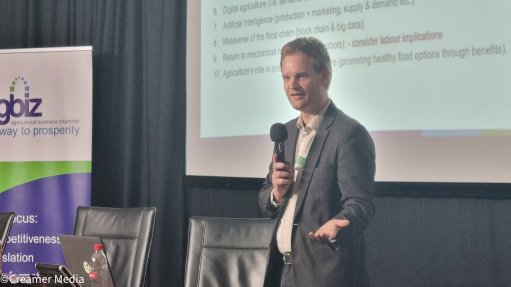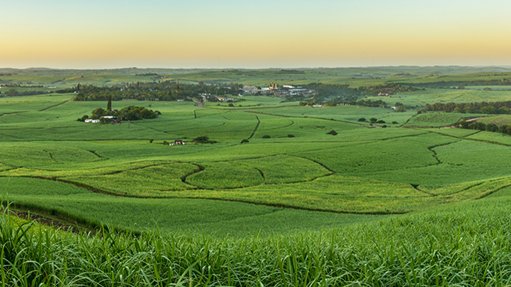South Africa should respond to macroeconomic turbulence with resilience and strategic foresight, Mavuso says
Following last week’s announcement by US President Donald Trump that South Africa will be subjected to 30% tariffs on all imports into the US, alongside the passing of the 2025 Budget that will see a 0.5 percentage point increase in value-added tax this year, Business Leadership South Africa (BLSA) CEO Busisiwe Mavuso says that South Africa must navigate these “turbulent waters” with resilience and strategic foresight.
In her weekly newsletter on April 7, she praised statements in recent days by International Relations and Cooperation Minister Ronald Lamola and Trade, Industry and Competition Minister Parks Tau in which they both largely agreed that the best way forward would be to work at improving relations with the US while still enhancing the focus both on stimulating domestic growth and improving South Africa’s trade relations within Africa and elsewhere, diversifying the country’s export markets.
Although Lamola on April 7 accused the US of spreading lies, misinformation and propaganda – this in response to US Congressman Ronnie Jackson’s recent call for targeted sanctions against several high-profile South African politicians over alleged corruption, human rights violations and links to terrorist organisations – Mavuso expressed satisfaction that both Lamola and Tau had chosen to focus on how South Africa could mitigate the impact of the worsening bilateral relationship with the US.
South Africa is not the only country that was met with US import tariffs on April 2. More than 50 nations were listed, with some African countries, such as Lesotho, receiving much higher tariff rates, at 50%.
“Trump has made it clear that he wants concessions from each country if he is going to reduce or drop the tariffs. He emphasised that the tariffs put the US in a position of power in the series of bilateral negotiations that are to come,” Mavuso said.
It should be noted that the countries targeted by Trump’s tariff policy had, for years, imposed tariffs on US exports while facing little to no equivalent tariffs in return. This is an imbalance that the current US administration seeks to address.
“Given the transactional nature of US politics, we have to think hard on what is commercially available and viable for all parties. The US has exempted many of our key metal exports, including platinum, gold, manganese, copper, zinc and nickel, because these are considered critical to the US economy,” Mavuso noted.
Tau said at a media briefing last week that South Africa was “exchanging notes” with other African trade Ministers, particularly on the African Growth and Opportunities Act (Agoa) trade deal, but also on how to engage with the US.
Mavuso commended Tau when, in reference to the unorthodox formula the White House used to arrive at its tariff level for each country, he said that African trade Ministers would seek to engage on how the US had adopted its trade policies.
The Financial Times has claimed to have “cracked the code” on the US tariffs formula. According to the news outlet, it took the US’s goods trade deficit with each country, divided it by the total amount of goods imported from that country and cut that percentage in half to arrive at the “reciprocal”’ tariff rate.
With this formula applied, the US put South Africa’s tariffs on US goods at 62% to calculate a 31% tariff rate, which will be effective from April 9.
Mavuso claimed that the average tariff rate was closer to 7.5%.
“Emotional reactions are never helpful in negotiation and BLSA agrees with President Cyril Ramaphosa’s example in avoiding inflammatory statements and events. South Africa is not exactly in the front of the queue of the many other countries that are trying to initiate trade talks with the US,” she noted.
Contrary to Mavuso’s claims, Ramaphosa called the US – and its leaders – bullies in his State of the Nation Address in February.
“Given South Africa’s weak negotiating position on the trade front, it is even more important that we look at what we can influence to improve the country’s economic situation. How do we build a stronger economy from here?” Mavuso asked.
She believes the answer lies in accelerating what has already been started – the many structural reforms that are in progress.
“In such troubled times, it is sometimes difficult to remember the positives but, over the past few years, our progress in two of our main problem areas – energy and transport – is hugely significant. Reforms in the water sector are beginning to get going and Operation Vulindlela (OV) is adding municipal reform to its target areas.
“The success of OV itself, [which is a] joint venture between the Presidency and National Treasury to accelerate reforms, is another huge positive for the country. Business remains committed to working with all levels of government to fast-track these imperatives,” Mavuso said.
She said it was time to intensify efforts, to give more momentum and impetus to the structural reform agenda because, despite the advances in energy and transport, both still have a long way to go before they are operating efficiently and serving as catalysts rather than impediments to growth.
“We also have to think of other ways to fortify our economy and, here, BLSA agrees with Lamola and Tau that strengthening and diversifying our trade relations with other countries is critical – and let’s bear in mind that most countries may now [also] need to reduce their dependence on trading with the US,” Mavuso pointed out.
She said that, outside of South Africa’s traditional trading partners, there was significant potential for increasing trade within Africa, which makes up only about 17% of the country’s merchandise trade, the bulk of which is in the Southern African Development Community region, according to think tank Trade Law Centre (Tralac).
The Africa Continental Free Trade Area (AfCFTA) Agreement came into force in 2019 but was effective only from October 2022, with the launch of the AfCFTA Guided Trade Initiative (GTI) a pilot initiative to test the operational, institutional, legal and trade policy environment under the AfCFTA.
The process has been slow but Tralac states that as of August last year, 48 of the 54 signatories had deposited their instruments of AfCFTA ratification and, since February, ten countries are actively trading under the GTI, including South Africa, which began trading on January 31, 2024, with export consignments from Durban to Kenya and Ghana. Many countries are still negotiating tariff concessions and rules of origin.
Mavuso said BLSA believed both business and government should pay renewed attention to the AfCFTA.
“It is hugely ambitious, bringing together so many countries with differing needs and priorities. But the final mechanisms are falling into place and improving trade with other African countries will be mutually beneficial,” she said.
Article Enquiry
Email Article
Save Article
Feedback
To advertise email advertising@creamermedia.co.za or click here
Press Office
Announcements
What's On
Subscribe to improve your user experience...
Option 1 (equivalent of R125 a month):
Receive a weekly copy of Creamer Media's Engineering News & Mining Weekly magazine
(print copy for those in South Africa and e-magazine for those outside of South Africa)
Receive daily email newsletters
Access to full search results
Access archive of magazine back copies
Access to Projects in Progress
Access to ONE Research Report of your choice in PDF format
Option 2 (equivalent of R375 a month):
All benefits from Option 1
PLUS
Access to Creamer Media's Research Channel Africa for ALL Research Reports, in PDF format, on various industrial and mining sectors
including Electricity; Water; Energy Transition; Hydrogen; Roads, Rail and Ports; Coal; Gold; Platinum; Battery Metals; etc.
Already a subscriber?
Forgotten your password?
Receive weekly copy of Creamer Media's Engineering News & Mining Weekly magazine (print copy for those in South Africa and e-magazine for those outside of South Africa)
➕
Recieve daily email newsletters
➕
Access to full search results
➕
Access archive of magazine back copies
➕
Access to Projects in Progress
➕
Access to ONE Research Report of your choice in PDF format
RESEARCH CHANNEL AFRICA
R4500 (equivalent of R375 a month)
SUBSCRIBEAll benefits from Option 1
➕
Access to Creamer Media's Research Channel Africa for ALL Research Reports on various industrial and mining sectors, in PDF format, including on:
Electricity
➕
Water
➕
Energy Transition
➕
Hydrogen
➕
Roads, Rail and Ports
➕
Coal
➕
Gold
➕
Platinum
➕
Battery Metals
➕
etc.
Receive all benefits from Option 1 or Option 2 delivered to numerous people at your company
➕
Multiple User names and Passwords for simultaneous log-ins
➕
Intranet integration access to all in your organisation





















